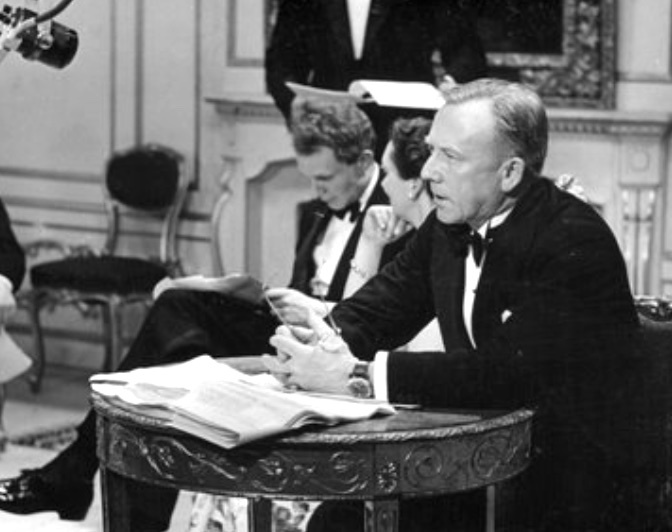OTD in early British television: 8 May 1939

John Wyver writes: Thirty months into the high definition service Mary Adams’ Talks programmes were becoming increasingly ambitious, with an increasing number of broadcasts featuring multiple guests. Perhaps the most ambitious was the 50-minute Salute to America on the evening of Monday 8 May, mounted to acknowledge the state visit by the King and Queen to Canada and USA.
Billed as ‘a programme of the contemporary American scene, described in speech and picture’, this assembled an impressive line-up including J.B. Priestley, Stephen Spender and Anglo-American novelist Susan Ertz (above, a youthful Spender, Ertz and travel journalist S.P.B. Mais), along with readings of verse by Walt Whitman and extracts from Abraham Lincoln’s speeches.
Sir Frederick Whyte, director-general of the English-Speaking Union, contributed a spoken portrait of President Roosevelt. And there were film extracts too, with a flight over Grand Canyon and Boulder Dam, and shots of liners in the docks of New York.
Inevitably, Grace Wyndham Goldie in The Listener was all over it:
There was an enterprising programme last week called Salute to America, which bristled with important personalities and raised enough general points about television to keep an international conference arguing for months. The idea behind the programme was sufficiently ambitious.
She noted the range of featured figures, as well as the inclusion of a variety of paintings, before asking,
Now why give us so complicated and curious a mixture? Obviously because the producer hoped that all the various items would fuse into a whole and that the result would have form in the way that a good film ·documentary· or a good broadcast ‘feature’ has form. But did the hoped-for fusion take place? It did not.
A great many of the items, notably much of the talk and the direct contact with some of the personalities, were so effective that the programme stands out as one of the high spots of the week. But there is no doubt that its elements remained as obstinately separate as the egg and milk in a curdled custard. And so the whole was no greater than its parts.
Why was this? Mainly, I believe, because the parts were on such different planes both of reality and of time. This is a special problem which television has to face. In a film documentary everything is film and everything is in the past. In a broadcast feature everything is sound and everything is done in the present, so that these things have an easy and natural unity.
But a television programme like Salute to America is a very different business. The personalities are real and are here now. The film is real enough but in the past. The disembodied voice is here now but comparatively unreal because we do not see the speaker. And the’ stills’ are dead pictures in the midst of living ones.
What’s the result of all this? Why, first, that the direct impact of living personalities makes so vivid an effect that everything else in the programme seems pale in comparison. And second, that the viewer is never able to settle down comfortably to receive impressions within one set of conventions.
Instead he (or she) is forced to leap, chamois-like, from one attitude of receptivity to another. The moral is that the reality of television, which is its strength, is obviously going to be difficult to handle, mainly because it doesn’t mix readily with other and less real forms such as film and sightless broadcasting.
And it doesn’t do to say that there is no need to bother about mixing it. For television must experiment with new ways of presenting personalities. The ability to let viewers meet real and important people is one of television·s trump cards. Obviously it is not being used to the best advantage if we merely get a series of straightforward interviews in front of the camera.
So we must have experiment. And if, as a result of experiment, the presentation of personalities can be made part of large programmes which have some sort of form it will be a triumph for television. Salute to America attempted this, heroically and with partial success. So it is right that we should welcome it and offer congratulations to Alexandra Palace.
Leave a Reply